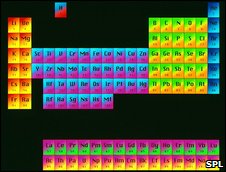| ||||||||||||||||||||||||||||||||||||||||||||||||
|
Discovered 13 years ago, and officially added to the periodic table just weeks ago, element 112 finally has a name. 13年前被发现,几周之前才被正式加入到元素周期表的新元素112终于有了名字。  The Periodic Table will be one element longer It will be called "copernicium", with the symbol Cp, in honour of the astronomer1 Nicolaus Copernicus. Copernicus deduced(推论,演绎出) that the planets revolved2 around the Sun, and finally refuted(驳斥,反驳) the belief that the Earth was the centre of the Universe. The team of scientists who discovered the element chose the name to honour the man who "changed our world view". The International Union of Pure and Applied3 Chemistry (IUPAC) will officially endorse4(支持,赞同) the new element's name in six month's time in order to give the scientific community "time to discuss the suggestion". Scientists from the Centre for Heavy Ion Research in Germany, led by Professor Sigurd Hofmann, discovered copernicium in fusion5 experiments in 1996. "After IUPAC officially recognised our discovery, we agreed on proposing the name (because) we would like to honour an outstanding scientist," said Professor Hofmann. Copernicus was born 1473 in Torun, Poland. His finding that the planets circle the sun underpins6(支撑,支持) much of modern science. It was pivotal(中枢的,关键的) for the discovery of gravity, and led to the conclusion that the stars are incredibly far away and that the Universe is inconceivably large. Under IUPAC rules, the team were not allowed to name the element after a living person. But when asked if, rules aside, he would have liked to have "hofmanium" added to the periodic table, Professor Hofmann told BBC News: "No, I think copernicium sounds much better." 点击  收听单词发音 收听单词发音
|
||||||||||||||||||||||||||||||||||||||||||||||||
- 发表评论
-
- 最新评论 进入详细评论页>>



